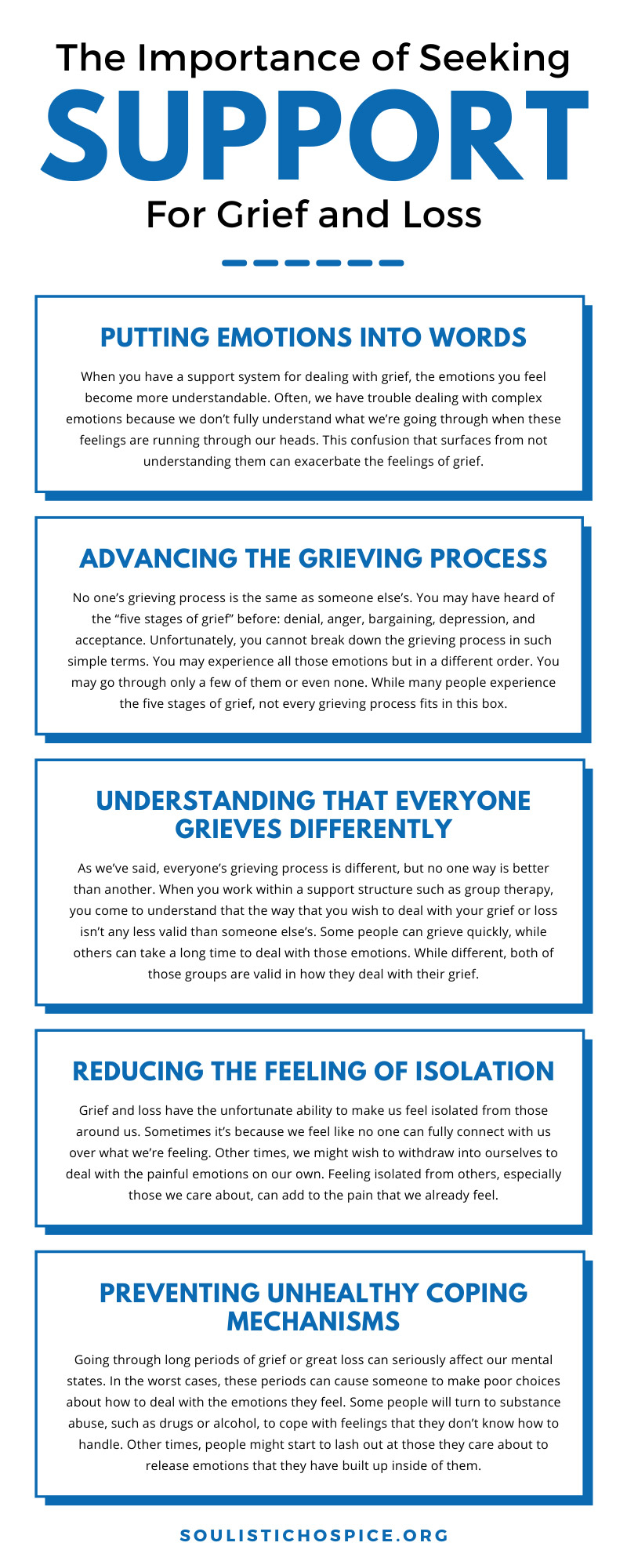
It’s an unfortunate fact of life that we can’t avoid loss. When someone you cared about is no longer around, it can leave a wound that seems like it won’t heal. Loss and the grieving that follows are a natural part of living, and everyone deals with it in different ways. While some may look inward for answers or comfort, others seek out these things beyond themselves. However you deal with loss, you should know that you don’t need to go through it alone.
Grieving and dealing with loss are intense, personal journeys, but that doesn’t mean that you can’t find help along the way. Asking for help through these difficult times will often benefit you more than shutting yourself away from the world. In this article, we’ll go over the importance of seeking support for grief and loss, so you can see why it might benefit you to reach out to others in your time of need. Remember that asking for help is not a sign of weakness but rather the strength of character to recognize when you can’t handle something alone.
Putting Emotions Into Words
When you have a support system for dealing with grief, the emotions you feel become more understandable. Often, we have trouble dealing with complex emotions because we don’t fully understand what we’re going through when these feelings are running through our heads. This confusion that surfaces from not understanding them can exacerbate the feelings of grief.
It’s important to seek support for grief and loss because talking through what you feel can help you better identify what the issue is. When you can place the real problem, you can begin taking steps to alleviate the painful emotions that go with it. Without support, these feelings can sit unaddressed inside of us until they manifest in unhealthy ways. Emotions are complicated, but finding the words to describe how we feel can make the healing process a little easier.
Advancing the Grieving Process
No one’s grieving process is the same as someone else’s. You may have heard of the “five stages of grief” before: denial, anger, bargaining, depression, and acceptance. Unfortunately, you cannot break down the grieving process in such simple terms. You may experience all those emotions but in a different order. You may go through only a few of them or even none. While many people experience the five stages of grief, not every grieving process fits in this box.
Even though the grieving process isn’t easy to define and categorize, everyone still goes through one. The problem comes from not addressing your feelings and staying stuck in the grieving stage from the beginning. A proper support system will help you come to terms with what you feel so that you don’t need to languish in sadness or anger. We can’t stay stuck in the past forever, and having a support structure in place can help move us forward when we can’t do so by ourselves.
Understanding That Everyone Grieves Differently
As we’ve said, everyone’s grieving process is different, but no one way is better than another. When you work within a support structure such as group therapy, you come to understand that the way that you wish to deal with your grief or loss isn’t any less valid than someone else’s. Some people can grieve quickly, while others can take a long time to deal with those emotions. While different, both of those groups are valid in how they deal with their grief.
Some people will feel guilty or upset over how long or difficult their grieving process is. The benefit of having a support system in place is having people who understand what you’re going through and who won’t try to push you beyond your comfort zone.
Reducing the Feeling of Isolation
Grief and loss have the unfortunate ability to make us feel isolated from those around us. Sometimes it’s because we feel like no one can fully connect with us over what we’re feeling. Other times, we might wish to withdraw into ourselves to deal with the painful emotions on our own. Feeling isolated from others, especially those we care about, can add to the pain that we already feel.
That’s why finding a source of support is so important. Even if you don’t feel comfortable finding support in your family or friends, there are other options that you can explore to find people who will support you. When you have people around you that can understand your struggles, those feelings of isolation and loneliness start to fade away. When we feel less alone, it becomes easier for us to heal.
Preventing Unhealthy Coping Mechanisms
Going through long periods of grief or great loss can seriously affect our mental states. In the worst cases, these periods can cause someone to make poor choices about how to deal with the emotions they feel. Some people will turn to substance abuse, such as drugs or alcohol, to cope with feelings that they don’t know how to handle. Other times, people might start to lash out at those they care about to release emotions that they have built up inside of them.
It’s important to seek out support when you start to realize that you aren’t feeling like yourself anymore or like you want to do something far outside of your character. The ability of support groups to ground you in the present and understand your feelings can help prevent you from making decisions that you might regret later. You don’t want to start relying on an unhealthy coping mechanism to help you get through grief or loss; it will only add to your problems later down the line.
Here at Soulistic Hospice, we understand how difficult dealing with grief and loss often is. If you or someone you know needs holistic hospice and palliative care, we are honored to help in any way that we can. While these subjects or loss and grief are never easy to bring up or talk about, we hope we can support you whenever you need it.









